During his long career at Pacific Gas & Electric and with IBEW Local 1245, Mike Davis didn’t have to raise his voice to make himself heard.
His knowledge of electric operations earned him high regard as a system operator in San Jose, while his deep commitment to labor’s cause won the respect of his union brethren. He turned a quiet personal style into a strength: He didn’t hurry. He listened well. He spoke up when it mattered.
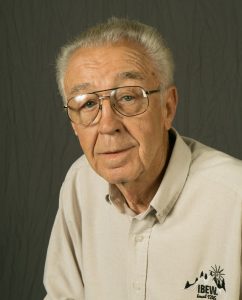
Mike Davis
Michael Davis—Executive Board member, Treasurer, Vice President, President, and 40-year Shop Steward for Local 1245—died Jan. 3 at age 75. On hearing the news, his union brothers and sisters stepped forward to praise not simply the service he gave but the man he was.
“He was deep-thinking, methodical, never quick to the trigger,” said fellow operator Dennis Silacci, who worked alongside Mike for decades in the San Jose area. “He was a very, very respected DO (distribution system operator). What he said carried a lot of weight in electric operations at the control center.”
But it was in his union work that Mike found his true calling. He volunteered to be a shop steward in 1969 while still in his lineman apprenticeship. He took his union role seriously enough to pursue a degree in labor studies at UC Berkeley in the 1970s. He remained a soft-spoken South Dakota farm boy in manner, but his steadfast commitment to worker rights and the principle of solidarity invariably won the respect of those who witnessed him in action.
Art Freitas, who served as the union’s vice president when Mike was president, got to see him up close. Mike was his mentor.
“He helped me with learning to run a meeting, learning how to make decisions,” said Freitas, who was appointed president when Mike stepped down from the position in 2014.
Freitas confesses he might have been overly “passionate” about certain issues when he first came on the Executive Board, sometimes reacting too quickly when he should have been gathering information instead.
“Mike told me the best thing to do was listen, analyze and then act—in that order,” Freitas said. Listening carefully, it turns out, is an important quality of leadership, especially when there are conflicting points of view to be reconciled.
“As president, Mike would listen to everybody and then he’d get everybody on the same page so we could come to a consensus,” Freitas said.
Mike Davis didn’t command unity. He quietly inspired it. A succession of union business managers benefited from Mike’s presence and his leadership qualities.
“I think he kept everybody honest,” said Jack McNally, business manager from 1980 to 2001. McNally thought Mike would make a good business representative for the union, but he was content to remain at PG&E. By all accounts, he liked the work, first as a lineman, later as an operator.
“He was steady,” said Perry Zimmerman, business manager from 2001 to 2006. “I never saw him angry, never saw him mad, he was a just a steady, easy-going really good guy.”
But underneath the easy-going surface there was something else going on.
“Mike grew up in South Dakota and his slow understated manner was straight from the Great Plains,” said current Business Manager Tom Dalzell. “But under the even, laconic surface was steel resolve. He had bedrock union principles from which he would not deviate.”
Die-Hard Union Man

Davis with his wife Dee
“He was a die-hard union man,” said the person who probably knew Mike best. That would be Dee, his wife of 40 years. “The union was something Michael thrived on. He loved his job as a lineman, as a rep, as a steward. It was like adrenaline for him. He just loved it.”
You might think that his leadership role in the union, in addition to working full-time at PG&E, might create some friction on the domestic front. But it just wasn’t so, according to Dee.
“He always made time for his family. As long as he remembered he had a home and a wife and kids, he could do whatever he wanted for the union,” she said.
Mike’s service to the union was kicked up a notch when members elected him to the Southern Area seat on the IBEW 1245 Executive Board in 1983. Around that time the California Public Utilities Commission was trying to reduce compensation for PG&E employees that had been lawfully negotiated by the union. It was a quick introduction to the challenges awaiting those who aspired to leadership positions in the union.
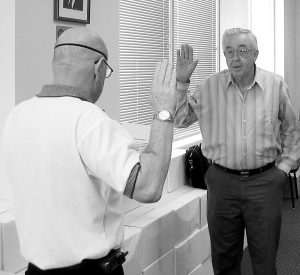
Davis was sworn in as President of the union in 2004
Mike narrowly lost his bid for re-election to the Executive Board in 1986, but was returned to that position by an overwhelming vote in 1989 and again in 1992.
In 1995, the union was grappling with massive downsizing by PG&E and the CPUC’s cockamamie plan to deregulate the state’s electric utility industry. These events posed a grave threat to utility service, utility jobs and the union’s treasury. So where was Mike Davis? He was running for union treasurer, winning election to that post in 1995, 1998 and 2001.
In 2004 Davis narrowly lost a bid to become vice president—edged out by Art Freitas. When President Ed Mallory unexpectedly resigned later that year, the Executive Board replaced him with one of the most seasoned leaders in the union stable: Mike Davis.
New Challenges
The challenges kept coming. PG&E was emerging from Chapter 11 bankruptcy in 2004 and promptly chose to plunge the workforce into fresh chaos with a plan for so-called Business Transformation. On top of that, the International Office of the IBEW had recently transferred a large chunk of Local 1245’s Outside Line membership to Local 47. Mike Davis now presided over the treasury of a union whose funds were dwindling and whose capacity to serve its members was under threat.
There was only one realistic solution. Local 1245’s dues at the time were significantly below most other IBEW locals. They needed to be raised. Increasing dues is something no elected union leader in his right mind ever wants to do. But Business Manager Tom Dalzell saw there was no other choice.
“Mike and I led the fight in 2008 to raise our dues to give us resources for the big fights that we knew were coming,” Dalzell said.
Mike’s stature and his calm demeanor were key assets in this difficult campaign.
“Mike never wavered,” Dalzell said.
“When we did the dues increase, he had to school the board in how we had to present this and why it was needed and how we were going to go about it,” said Freitas. Members approved the dues hike overwhelmingly.
And the big fights came. One of the biggest was stopping NV Energy from cutting medical benefits for retired IBEW 1245 members. It was an expensive fight, but one the union could now afford, thanks in part to the PG&E system operator from San Jose who wasn’t afraid to make hard choices if it was for the good of the union.
“He was very good. He was all for the members,” said Anna Bayless Martinez, the union’s current vice president. When the Executive Board faced difficult decisions, Mike’s patient manner helped smooth the way.
“He was always very respectful. He never had a bad word about anybody. It was very rare that he ever said anything negative,” Bayless Martinez said. She thought about that for a second, then added: “Oh, he’d get a look. But he’d never say.”
Retired Senior Assistant Business Manager Dorothy Fortier believed Mike’s overriding goal was to “unify our membership” regardless of the circumstances. Unity, after all, is what gives the union its strength. As much as anyone, Mike Davis spent his decades at IBEW 1245 crafting unity. “He was a person of honor and integrity,” Fortier said.
Farm Boy
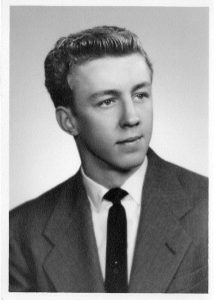
Davis’ high school yearbook photo
Michael Davis was born April 26, 1943 and grew up on a farm in White, South Dakota, according to his fellow operator Dennis Silacci.
“He was a country farm boy, talked about it all the time, talking about his dad and his uncle on the ranch,” Silacci said.
After graduating high school he went directly into the Navy, serving on the USS Midway as an electrician’s mate. Silacci thinks he served a total of six years.
From the Navy, Mike went directly into PG&E, hiring on as a goundman in the electric department. He became the lead lineman for Corwin “Corky” Spears, according to Silacci.
Silacci acknowledges the obvious facts about Mike Davis. He was “logical.” He was “easy-going.” He was “even-keeled.”
But Silacci also saw another side of Brother Davis that not everyone got a chance to see. As linemen, the two men often “worked on the same pole, worked on the same tower.” And when Mike became an operator in 1980, it wasn’t long before Silacci made the same move.
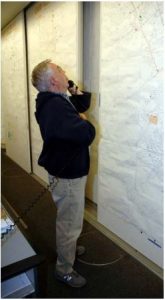
Davis worked as a DO for many decades. This photo was captured of him at work in 2007.
“We literally worked side-by-side from 1970 to 2008,” Silacci said. This gave Silacci plenty of time to see Mike Davis in action. To see him when he wasn’t quite so “even-keeled.”
“I remember during the storm of 1974 they had us working 12-hour days, seven-days a week, just about three weeks straight. That was up in the Santa Cruz mountains.” The whole mountain had lost power, the way Salacci tells it.
After a couple of weeks the general foreman came out and told the linemen they could have the following weekend off, but a couple of days later he came back and held another tailboard. He said he wanted the men to keep working that weekend because they were all mobilized, they had all the equipment and all the material in place, and management wanted the crews to “button up the whole hill and put it to rest.”
That didn’t sit too well with Mike Davis. Salacci recalled the scene:
During the tailboard, Mike tells the general foreman, “You said we could have the weekend off, and now you’re changing it. I made some plans and I’d like to keep them.”
The GF said, “Well Michael, you’re going to have to change your plans because we’re going to be working this weekend.”
But Mike isn’t ready to give up his plans, and he tells the general foreman, “All due respect, sir, my wife was thinking about getting pregnant this weekend and I kind of wanted to be there.”
But it was emergency work there on the mountain and no one was allowed off. Salacci continued:
Mike worked just like the rest of us. Nobody got the time off. It was kind of a condition of our employment, you know. But it was all good. We made a lot of money. We were young.
It wasn’t easy to get Mike to take the bait in an argument. Minnesota nice may run deep, but South Dakota polite apparently runs deeper. Naturally that didn’t stop Salacci from trying to ruffle Mike’s unrufflable feathers. He recalled this incident from their operator days:
One time I wrote a load transfer to clear a station bank out of San Jose B. Mike was the switch checker. He checked my tag that I wrote and he was questioning why I wrote it a specific way. I explained to him that I preferred that the switching go a little different way than we had gone in the past and I did all the load checks and I knew it would work. He kept saying that that wasn’t the way we routinely did a tag.
Mike was his senior, but by now they were both veteran operators, so Salacci tried his hand at getting a rise out of his friend.
So I said, “Listen you decrepit old fart, that’s the way we’re switching it, that tag works just fine.” And Mike says, “OK, the tag works fine.” And he’s checking the tag and then he’s signing it. Finally he says, “OK, I guess that’s why they make Fords and Chevys.”
“That was Michael’s logic,” said Salacci. “You gotta love Michael Davis. We were like brothers.”
Salacci knew there was one sure way to get Mike riled up. But you had to wait until meal time.
When he gets hungry and he wants to eat—oh boy, does he cop an attitude. When it was time to eat it was time to eat. We’d be on swing shift together. He’d say, “We’re going to eat together,” and I’d say, “Oh yeah, we’ll eat,” but I’d keep on working. And a little later he’d say, “When are we going to eat?” And I’d say, “Oh yeah, we’ll eat,” and keep working. Then later he’d say, “When are we going to eat?” but he’d say it with a little more attitude.
And Salacci can tell you what Mike would eat, given half a chance: KFC. Three pieces. Extra crispy. Mashed potatoes. Cole slaw. “He had to have cole slaw.”
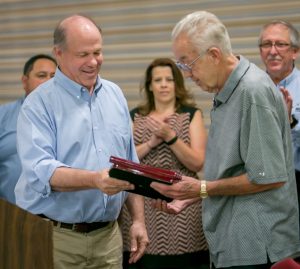
Dalzell presented Davis with a commemorative plaque when he retired from his role as union president in 2015.
Mike voluntarily resigned as president when he learned he had Alzheimer’s. His wife Dee said it “broke his heart” to retire from the union life he loved.
“But he knew it was the best thing for him to do. He took the step he knew needed to be taken. He cared that much about the union,” Dee said.
Silacci visited Mike a couple of times after he retired. Mike still had a cat. Mike had a parakeet. The South Dakota farm boy liked his animals.
“Mike treated his animals just like they were as important as any other living thing he knew,” Salacci said.
But sadly, Mike’s rottweiler, Otto, had passed away. Rottweilers, of course, are a powerful breed. They’re known to be calm and confident, courageous but not unduly aggressive.
“His rottweiler was much like him,” said Silacci. “Very nice.”
Mike Davis, union brother, is survived by his wife Dee, sons Joseph Molina and Bryon Davis, and three grandchildren. A third son, Michael Molina, died in 1985.
He is also survived by the current members of a grateful union.
–Eric Wolfe, IBEW 1245 Communications Director Emeritus